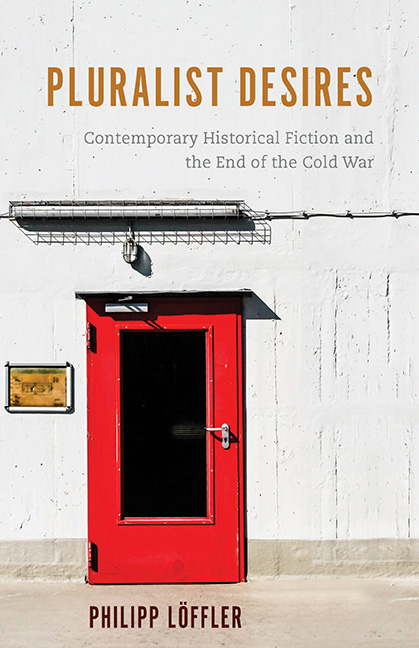Book contents
- Frontmatter
- Contents
- Acknowledgments
- Introduction: Saving Private Ryan, the End of the Cold War, and the Value of Historical Experience
- 1 The Uses of History: From Nineteenth-Century Historicism to Twenty-First-Century Pluralism
- 2 “No Longer and Not Yet”: Don DeLillo and the Aftermath of the Cold War
- 3 After Race: Body Language and Historiography in Toni Morrison's Beloved and A Mercy
- 4 “A Singular Act of Invention”: Storytelling, Pluralism, and Philip Roth's American Trilogy
- 5 Lukácsian Aesthetics, Self-Creation, and Richard Powers's Plowing the Dark
- Epilogue
- Notes
- Bibliography
- Index
Epilogue
Published online by Cambridge University Press: 05 February 2016
- Frontmatter
- Contents
- Acknowledgments
- Introduction: Saving Private Ryan, the End of the Cold War, and the Value of Historical Experience
- 1 The Uses of History: From Nineteenth-Century Historicism to Twenty-First-Century Pluralism
- 2 “No Longer and Not Yet”: Don DeLillo and the Aftermath of the Cold War
- 3 After Race: Body Language and Historiography in Toni Morrison's Beloved and A Mercy
- 4 “A Singular Act of Invention”: Storytelling, Pluralism, and Philip Roth's American Trilogy
- 5 Lukácsian Aesthetics, Self-Creation, and Richard Powers's Plowing the Dark
- Epilogue
- Notes
- Bibliography
- Index
Summary
Since the early 1990S a number of severe and still smoldering political conflicts have occurred that continue to challenge the idea of a new network of power relations that many observers believe have supplanted the antagonisms of the Cold War era. The present is shaped by a perceived absence of meaning and the threat of the unknown much rather than by a new cosmos of world politics and culture. Twenty-five years after the fall of the Berlin Wall, the post–Cold War world is still in the making, and politicians and critics alike keep disagreeing about what the precise nature of this world is and how to approach it most effectively. If there is common ground for debate, it surfaces in the assumption of an era defined by global rather than national conflicts and struggles. Habermas's proposition of a “postnational constellation” has never seemed timelier, and visions of a “world risk society” still loom large in current arguments about the post–Cold War period.
It remains unclear what the exact role of literature and literary studies can be in this period of prolonged uncertainty. And yet it is hard not to notice the increased efforts of scholars to construct analogies between what they think goes on in this new world and what they think goes on within their departments and disciplines. The “worlding of America,” “hemispheric” and “transnational American Studies,” “globalism,” and “Empire Studies” are all terms designed to refer to real political events and movements as much as they are made to amplify scholarly prestige. It almost seems like a critical disciplinary imperative to make literature and culture look as if they directly reflect and criticize the current political condition.
Forms of cultural production are firmly embedded within the social world; this much is true. But what exactly does that mean? In the case of literature, it simply means that the way people live affects how they write and read books—and vice versa. This connection between life and literature— obvious as it may seem—denies broad generalizations and instead requires sociologically nuanced analyses of distinct social and cultural groups. There is, for instance, literature of the working poor in Western urban settings, and there may also be literature of middle-class academics in the United States. There is not, however, a literature of globalization, or a hemispheric or transnational literature as such.
- Type
- Chapter
- Information
- Pluralist DesiresContemporary Historical Fiction and the End of the Cold War, pp. 143 - 144Publisher: Boydell & BrewerPrint publication year: 2015

